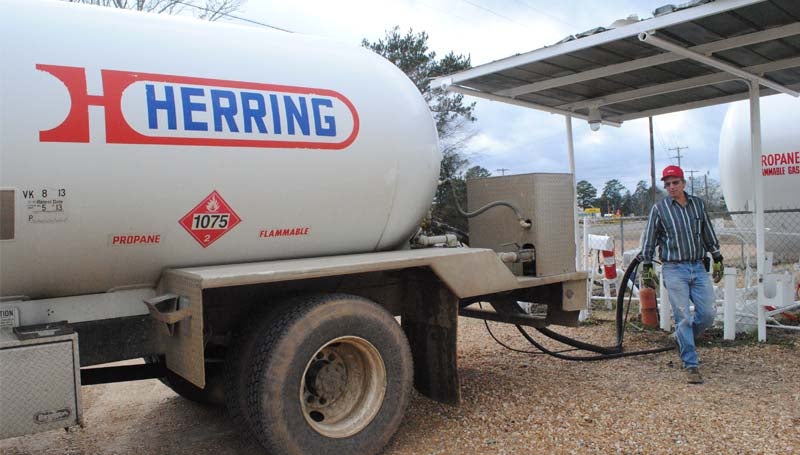A ‘Perfect storm’: Multiple factors lead to propane shortage
Published 11:30 pm Saturday, February 15, 2014

THE DAILY LEADER / RHONDA DUNAWAY / Herring Gas truck driver Mike Rials stops for refueling between deliveries Friday on Highway 51 in Brookhaven.
A long frigid winter, a wet midwestern growing season and exports that are at an all time high have sent propane prices soaring and put pressure on gas companies to keep consumers supplied at a reasonable price.
Gas companies are dealing with drastically increasing propane prices because of a shortage. A letter addressed to President Obama and signed by 29 U.S. senators including Mississippi Republican Sens. Thad Cochran and Roger Wicker asked the president to assess the crisis.
A press release from the U.S. Senate quotes the senators’ letter:
“We ask you to identify and implement sensible strategies, provided by law, to guide federal agencies in assisting states with efforts to mitigate the effects of the current propane shortage. In particular, we ask you to review all available options to facilitate and enable the transportation of propane to areas with shortages, via interstate pipelines and other modes of transportation.”
Local gas suppliers say a combination of factors created the shortage.
Customer service representative Michael Wright at Ferrell Gas explained, “This has been a perfect storm – record corn crops and a wet season caused farmers in the Midwest to use propane equipment for drying out their stores, record high exports of propane and a winter that came early and has been very cold. There’ve also been issues with pipelines and supply lines.”
Gas companies take issue with most of the U.S.’s propane being shipped overseas for higher profits.
Jody Herring, president of Herring Gas, whose corporate offices are on Main Street in Meadville, said at a time when American customers most need it, the U.S. is exporting more natural gas than ever before.
“What I’ve seen has been unprecedented,” he said of the amount of U.S. propane shipments. “The producers in the U.S. have gotten used to putting it on cargo ships that can get them a higher price for their product.”
Herring said the price increases have been tough on business.
“Here at Herring Gas we haven’t had as much of an issue with the shortage, but we don’t like the prices we are paying,” Herring said. “We are paying three or four times what propane cost before this.
“When the prices get like they are now, people start making different decisions – they say, ‘Hey, I think we’ll go with electricity.”
Herring and Wright said their companies are using distribution strategies to keep customers provided what they need.”
“We have limited the amount of propane we are distributing,” Herring said. “It’s frustrating. It’s kind of like we are riding a horse and we’ve got to keep pulling the reins in and sell as little propane as possible – it’s crazy because it is contrary to how we are supposed to run our business.”
Wright said Ferrell is taking similar measures.
“While supply has been tight,” Wright said, “We have not let our customers go without, and we’ve tried to hold that price line in as much as possible. We’ve been hindered like everyone else, but we have not interrupted service to any of our customers.”
Herring is hopeful that the situation will turn around soon with spring right around the corner.
“It’s been real touch and go,” Herring said, “but, with the warmer weather, this thing could go away as fast as it came about. The northeast is fixing to dig out of the winter weather, and we are seeing some warm weather now. And the regulating agencies have made some of the big producers ship propane to the Midwest.”
Wright said he was relieved to learn that the 29 U.S. senators were taking action.
“I am very pleased with the legislators,” he said. “There needs to be steps taken where if this happens again we’re not suddenly paying double and triple what we should be paying.”

